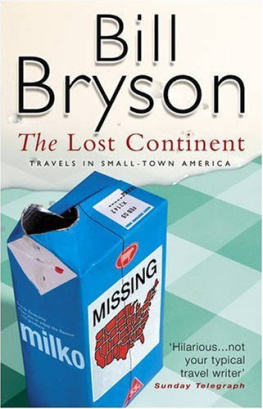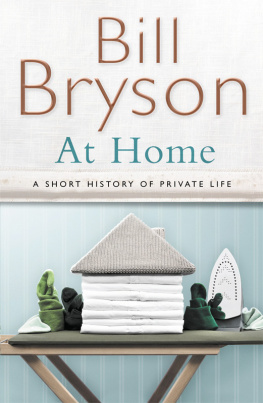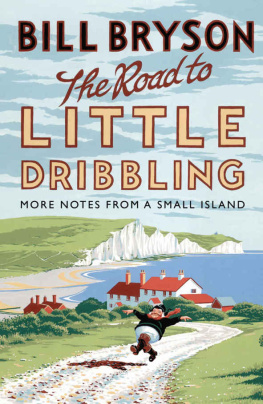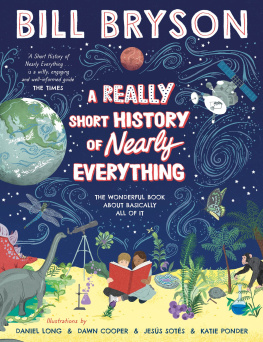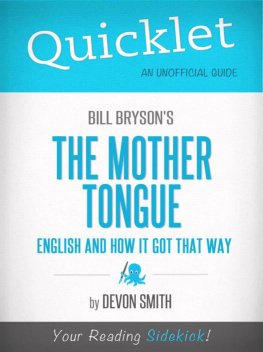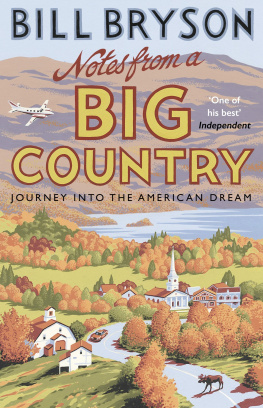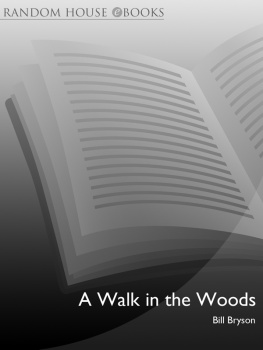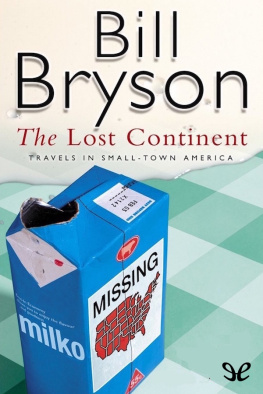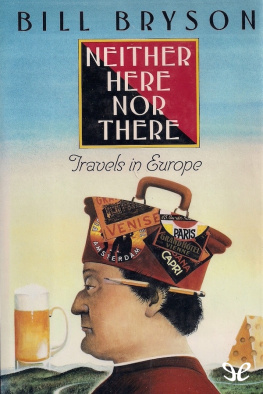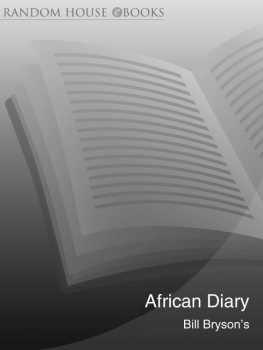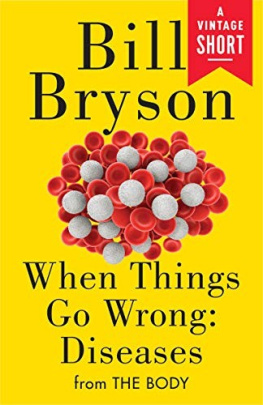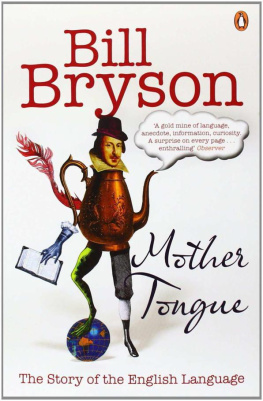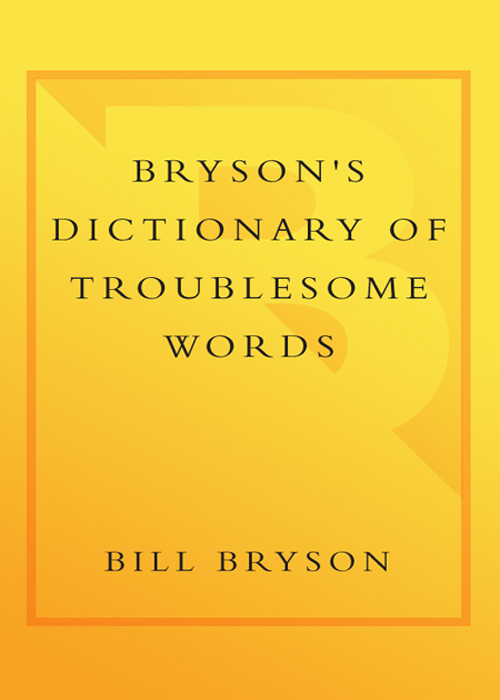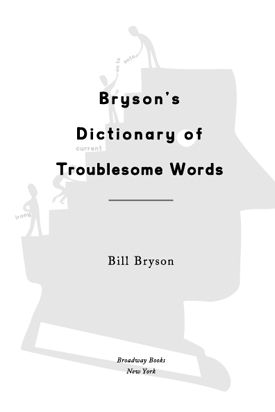contents
introduction
T he physicist Richard Feynman once remarked that every time a colleague from the humanities department complained that his students couldnt spell a common word like seize or accommodate, Feynman wanted to reply, Then there must be something wrong with the way you spell it.
There is something in what he said. English is a merry confusion of quirks and irregularities that often seem willfully at odds with logic and common sense. This is a language where cleave can mean to cut in half or to hold two halves together; where the simple word set has 126 meanings as a verb, 58 as a noun, and 10 as a participial adjective; where if you run fast you are moving swiftly, but if you are stuck fast you are not moving at all; where colonel, freight, once, and ache, among many thousands of others, have pronunciations that are strikingly at odds with their spellings; where some Latin plurals are treated always as singular (agenda) and some are treated always as plural (criteria) and some (data, media) are regarded by some careful users as plural and by others as singular. I could go on and on. Indeed, in the pages that follow I do.
In many ways the text contained here represents not so much a new edition of an old book as a new edition of an old author. When I put together The Penguin Dictionary of Troublesome Words (as it then was) in 1983, I was a young copy editor on the London Times, and it was a fundamental part of my job to be sensitive to and particular about points of usage. It was why they employed me, after all, and I took the responsibility seriously.
So seriously, in fact, that when I realized there were vast expanses of English usagelinguistic Serengetisthat I was not clear about at all, I wrote to a kindly editor at Penguin Books named Donald McFarlan and impetuously suggested that there was a need for a simple, concise guide to the more confusing or problematic aspects of the language and that I was prepared to undertake it. To my astonishment and gratification, Mr. McFarlan sent me a contract and, by way of advance, a sum of money carefully gauged not to cause embarrassment or feelings of overworth. Thus armed, I set about trying to understand this wonderfully disordered thing that is the English language.
As I observed in the first edition, the book that resulted might more accurately, if less convincingly, have been called A Guide to Everything in English Usage That the Author Wasnt Entirely Clear About Until Quite Recently. Nearly everything in it arose as the product of questions encountered during the course of daily newspaper work. Should it be fewer than 10 percent of voters or less than 10 percent? Does someone have more money than her or than she?
The answers to such questions are not always easily found. Seeking the guidance of colleagues, I discovered, is dangerous: raise almost any point of usage with two journalists and you will almost certainly get two confident but contradictory answers. Traditional reference works are often little more helpful, because they so frequently assume from the reader a familiarity with the intricacies of grammar that isin my case, at any rategenerous. Because of such difficulties, many users of English continue to make usage decisions based on little more than durable superstitions and half-formed understandings. Many, for example, doggedly avoid split infinitives in the conviction that it endows their sentences with superior grammar. (It does not.) Others avoid hopefully as if it were actively infectious and instead write the more cumbrous it is hoped to satisfy an obscure point of syntax that I suspect few of them could elucidate. Too often for such people the notion of good English has less to do with expressing ideas clearly than with making words conform to some arbitrary pattern.
But at the same time, anything that helps to bring order to the engaging unruliness that is our language is, almost by definition, a good thing. Just as we all agree that clarity is better served if cup represents a drinking vessel and cap something you put on your head, so too, I would submit, the world is a fractionally better place if we agree to preserve a distinction between its and its, between I lay down the law and I lie down to sleep, between imply and infer, forego and forgo, flout and flaunt, anticipate and expect, and countless others.
One of the abiding glories of English is that it has no governing authority, no group of august worthies empowered to decree how words may be spelled and deployed. We are a messy democracy, and all the more delightful for it. We spell eight as we do not because that makes sense, but because that is the way we like to spell it. When we tire of a meaning or usage or spellingwhen we decide, for example, that masque would be niftier as maskwe change it, not by fiat but by consensus. The result is a language that is wonderfully fluid and accommodating, but also complex, undirected and often puzzlingin a word, troublesome.
What follows should be regarded less as a book of instruction than as a compilation of suggestions, observations, and even treasured prejudices. Never forget that no one really has the right to tell you how to organize your words. If you wish to say between you and I or to use fulsome in the sense of lavish, it is your privilege to do so and you can certainly find ample supporting precedents among many distinguished writers. But you may also find it useful to know that such usages are at variance with that eccentric, ever-shifting corpus known as Good English. Identifying that consensus, insofar as such a thing is possible, is the principal aim of this book.
Some 60 percent of the material is new since the original Dictionary of Troublesome Words. This is not, alas, because I am now 60 percent better informed than I was nearly twenty years ago. In fact, very nearly the reverse. I cant begin to tell you (or at least I prefer not to tell you) how many times while reviewing the original text I found myself thinking, I didnt know that. Why, Ive been making that mistake for years. The revisions herein consist largely of elaborations on much that I had forgotten I once knew, and additions concerning matters that have come to my attention since. In an alarmingly real sense, the alternative title now could be Even More Things in English Usage That the Author Wasnt Entirely Clear About Until Quite Recently.
The book is notindeed, cannot bea style guide. Whether to write email or e-mail, NATO or Nato, Vietnam or Viet Nam is, for most users, a question of preference or of house style. Only occasionally, where the weight of usage has shifted in recent years, as with the South American country Suriname (or Surinam), does the book touch on stylistic issues. Nor, except tangentially (and perhaps just a touch idiosyncratically), does it deal with questions of pronunciation. By design the books scope is slightly more international than is perhaps typical. It seems to me that as the world shrinks and communications become increasingly global, there is every reason to keep our horizons broad. You might never have an occasion to check whether the Australian eminence is Ayers Rock or Ayers Rock or need to distinguish Magdalene College, Cambridge, from Magdalen College, Oxford, but the chances that you will are vastly greater now than they were twenty years ago, and so I have kept such entries in.



